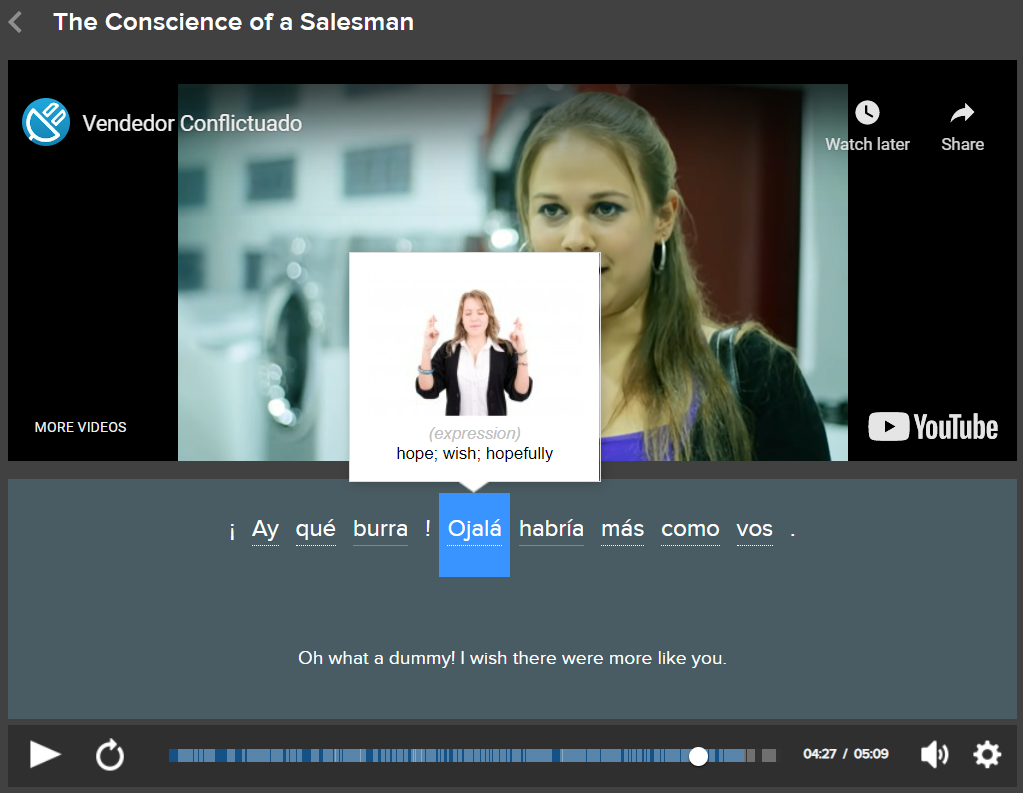
“Did it hurt when you fell from heaven?”
Oh, pick-up lines. Even though a corny piropo (pick-up line) might make you want to roll your eyes, you have to admit they’re fun to learn and share!
Pick-up lines in Spanish employ clever plays on words and evoke images both poetic and mundane.
Read on to find out some of the best ones, and learn some Spanish while having a good laugh!
Contents
- 1. Si besarte fuera pecado, caminaría feliz por el infierno.
- 2. Si el agua fuese belleza, tú serías el océano entero.
- 3. Si Cristóbal Colón te viera, diría: ¡Santa María, qué Pinta tiene esta Niña!
- 4. Si yo fuera azafata, te llevaría en mi avión, pero como no lo soy, te llevo en mi corazón.
- 5. Si tus ojos fueran el cielo y tu boca el mar, me gustaría ser el horizonte para poderte besar.
- 6. Quisiera ser joyero para poder apreciar todos los días un diamante como tú.
- 7. Ojalá fueras bombero para apagar el fuego de mi deseo.
- 8. Ojalá la mitad de las estrellas brillaran tanto como tus ojos.
- 9. Me gustaría ser lente de contacto para que no pudieras sacarme tu mirada.
- 10. ¿Te dolió cuando te caíste del cielo?
- 11. Debo estar muerto porque estoy viendo angelitos.
- 12. Hay una fiesta en mi corazón y tú estás invitado.
- 13. Espero que te guste la fruta, porque yo soy tu media naranja.
- 14. ¿Hace calor aquí o eres tú?
- 15. Tus labios parecen solitarios, ¿les gustaría conocerse con los míos?
- 16. ¿Me harías el honor de un baile?
- 17. Diría que Dios los bendiga, pero parece que ya lo hizo.
- 18. ¿Perdone, está ocupado este asiento?
- 19. Tu papá debe ser pirata, porque eres un tesoro.
- 20. Si amarte fuera trabajo, no existiría el desempleo.
- Using the Past Subjunctive in Spanish Pick-up Lines
- Why Learn Pick-up Lines in Spanish?
Download:
This blog post is available as a convenient and portable PDF that you
can take anywhere.
Click here to get a copy. (Download)
English Meaning: If kissing you were a sin, I’d happily walk through hell.
Note the structure of this sentence: It starts with the word si (if) and contains a past subjunctive verb as well as a verb in the conditional tense. Lots of piropos take this structure, so you’ll want to learn it and learn it well!
Using the conditional verb caminaría (I would walk) is technically correct, but in colloquial Spanish you could also use the imperfect caminaba. Since piropos are by definition colloquial Spanish, you should expect to hear these variations quite a bit.
English Meaning: If water were beauty, you’d be the whole ocean.
Here we have another si clause, this time using the same verb in the past subjunctive and conditional forms: ser (to be).
Note that this pick-up line uses the verb fuese instead of fuera. Remember, those two verbs are completely interchangeable! Any time you see a verb in the past subjunctive, keep in mind that it has an equivalent form.
English Meaning: If Christopher Columbus saw you, he’d say, “Saint Mary, that girl looks incredible!”
This piropo is a great example of how certain things just don’t translate between English and Spanish.
This one has several different layers to work through. First, remember that Cristóbal Colón is Christopher Columbus’s name in Spanish. And if you’ve forgotten elementary school American history, here’s a quick reminder: The three ships that Columbus sailed to America were the Niña, the Pinta and the Santa María.
Now that we have the historical context, it’s also important to remember that Santa María (Saint Mary) can be used as an interjection in Spanish, like “oh my God!” and that tener pinta is a colloquial way to say that someone (or something) looks good.
With all that in mind, go back and read the Spanish version of the piropo. Does it make more sense now?
Take note: Although this is also a si clause, it differs from the two we’ve seen so far because its verb doesn’t come from ser. In this case, the past subjunctive verb is viera, from the verb ver (to see).
English Meaning: If I were a flight attendant, I’d carry you in my airplane, but since I’m not, I’ll carry you in my heart.
This cute rhyming pick-up line consists of a compound sentence. The first half is a si clause like the ones we’ve seen so far, including the past subjunctive verb fuera from ser (to be) and the conditional verb llevaría from llevar (to take).
The second half of the pick-up line is written in the indicative, with two present tense indicative verbs: soy (I am) and llevo (I take).
Because the first half of the sentence describes a dream or a hypothetical (If I were a flight attendant…), it requires subjunctive and conditional tenses. The second half of the sentence deals with reality (I’m not a flight attendant) so you can stick to the indicative.
English Meaning: If your eyes were the sky and your mouth were the sea, I’d like to be the horizon to be able to kiss you.
Here we have another great example of a si clause using the verbs ser (to be) and gustar (to like, to please). But this pick-up line touches on another tricky grammar issue as well: the difference between por and para.
Look at the second half of the sentence: Me gustaría ser el horizante para poderte besar. (I’d like to be the horizon to be able to kiss you).
We use both por and para to describe reasons for doing things, but the two words are not interchangeable. Use por when talking about the cause for an action, and use para when talking about motivations. Roughly speaking, you can translate por to “because of” or “due to,” and you can translate para to “in order to” or “so that.”
Quiero aprender español por su belleza y utilidad.
(I want to learn Spanish because of its beauty and usefulness.)
Quiero aprender español para poder conseguir un trabajo en Argentina.
(I want to learn Spanish so that I can get a job in Argentina.)
Given this distinction, it’s clear why the pick-up line uses para: It describes a motivation and a potential future action.
English Meaning: I’d like to be a jeweler to be able to appreciate a diamond like you every day.
Si clauses are one use of the past subjunctive, but they are far from the only use. With this pick-up line, we move away from si clauses, which is why you won’t see any verbs conjugated in the conditional tense.
Quisiera, from the verb querer (to want) is a special verb in the past subjunctive. It’s a very polite or elegant way to say “I’d like,” not much different from me gustaría (I’d like).
English Meaning: If only you were a firefighter to be able to put out the fire of my desire.
Whenever you see the word ojalá (God willing), you should be prepared to follow it up with a subjunctive verb. But the tense of the subjunctive verb (past or present) changes the meaning of the word somewhat.
When you follow ojalá with a present tense verb, it means something like “hopefully” or “God willing,” and with good reason—the word has its roots in the Arabic word Allah (God).
¡Ojalá tengas suerte!
(Hopefully you’ll have good luck!)
However, with the past subjunctive, ojalá expresses an impossible desire and is similar to the English “If only…” or “I wish I could…”
Because of this, ojalá plus the past subjunctive is perfect for romantic proclamations, such as the one above!
English Meaning: If only half of the stars in the sky shined as brightly as your eyes.
Here’s another example of ojalá plus the past subjunctive, this one even more romantic than the last!
Unsurprisingly, there are many piropos that involve shining stars and shooting stars. Here are a few more to use on romantic star-lit nights:
No necesito que la noche caiga para poder ver las estrellas.
(I don’t need it to be night to be able to see the stars.)
Tú eres la estrella que guía mi corazón.
(You are the star that guides my heart.)
¿Qué hace una estrella volando tan bajo?
(What’s a star doing flying so low?)
English Meaning: I’d like to be a contact lens so you couldn’t take your eyes off me.
Some piropos evoke beautiful images of the sea, the stars, the moon… and others just talk about contact lenses! Pick-up lines in Spanish, like in English, don’t have to be super-serious and passionate. Some of the most entertaining ones are silly plays-on-words like the one above.
Para que (so that) is another trigger phrase that should let you know you’ll likely need to use a subjunctive verb. In this case, since you’re talking about a desire or unlikely event, use the past subjunctive.
English Meaning: Did it hurt when you fell from heaven?
You’ve probably heard this classic pick-up line in English, and now you can add the Spanish version to your arsenal! This one is sure to earn you a smile. It’s a nice, straightforward phrase that should roll off the tongue when the pressure’s on—you can thank us later.
Here we also see the verb doler (to hurt/to be painful)—which is used similarly to the verb gustar—in action with the indirect object pronoun te (you).
English Meaning: I must be dead because I’m seeing angels.
Noticing a certain theme here? To expand on our angel and heaven-themed pick-up lines, we have this gem.
Note that because muerto (dead) is an adjective, if you’re a woman the phrase will change slightly to “Debo estar muerta porque estoy viendo angelitos.”
English Meaning: There’s a party in my heart and you’re invited.
They won’t be able to resist this one—I mean, who doesn’t like a good party? And in your heart, too?
Remember to change the word invitado to invitada if you’re addressing a woman.
English Meaning: I hope you like fruit, because I’m your half-orange.
As strange as this one may sound, it does actually make sense in the Spanish-speaking world. Here’s a bit of context: In Spanish, it’s common to use the phrase media naranja (literally, half-orange) to mean “soulmate.” See, sweet isn’t it!
Not only is this one a lil’ bit cute, but it will earn you brownie points for being creative!
English Meaning: Is it hot in here or is it just you?
There’s no time for beating around the bush—we’re turning things up a notch with this one!
This is another good opportunity to see how Spanish isn’t always translated literally into English: “¿O eres tú?” technically translates to “or are you, you?” If you’re a beginner this line may feel a little strange to say at first, but just go with it.
English Meaning: Your lips look lonely, would they like to meet mine?
If you thought the last one was direct, think again. This is definitely a “big risk, big reward” type situation—it has the potential to fail spectacularly, but who knows, maybe it’s worth the risk.
In any case, I salute anyone who is confident enough to utter this phrase to their love interest.
English Meaning: Would you do me the honor of a dance?
Asking someone for “the honor of a dance” may seem a little boring after our spicy pick-up lines, but you can never go wrong with respecting someone’s boundaries!
Here we make use of the conditional tense with harías (you would/would you). If you prefer to simplify things, you could also use the conditional tense to say: ¿Bailarías conmigo? (Would you dance with me?)
English Meaning: I’d say “God Bless You,” but it looks like he already did.
Disclaimer: In order to nail this one, we’ve got to get the timing right. You can’t just throw it into a conversation willy-nilly (well you could, but it would hinder rather than help your efforts). You must wait until the other person sneezes before making your move.
We can see the subjunctive in action in this sentence, with the trigger word que followed by bendiga (which comes from bendecir, meaning “to bless.”)
English Meaning: Excuse me, is this seat taken?
This is probably one of my favorite pick-up lines in our list because it’s both safe—if they aren’t into it, you could pretend you literally needed the seat—and polite. Note the use of perdone, which is used with the formal usted.
In fact, this is a good teaching moment: If you’re flirting with a stranger and aren’t sure whether to use tú or usted, play it safe and go with usted!
English Meaning: Your dad must be a pirate because you’re a treasure.
Here’s yet another example of how things don’t always translate literally between English and Spanish. Where in English we use the indefinite article “a” in the phrase “must be a pirate,” in Spanish it suffices to say “debe ser pirata” (literally, “must be pirate”).
This is because we don’t need to use an indefinite article (or any article at all) when talking about things like your profession, nationality, or religion—so I guess being a pirate counts as a profession!
English Meaning: If loving you was a job, unemployment wouldn’t exist.
To wrap up our list of pick-up lines, we’ve got this cheeky phrase that showcases both the past imperfect and conditional tenses.
We saw this structure in our very first phrase: it begins with si + verb in the past subjunctive tense + verb in the conditional tense. While this structure is common with piropos, it’s also a handy structure to know for everyday Spanish.
Using the Past Subjunctive in Spanish Pick-up Lines
You may have noticed that many of our Spanish pick-up lines feature the infamous “past subjunctive”.
Whether you’re a total newbie or just want a quick refresher, fear not! This post has got you covered on the basics.
First, let’s review the conjugation of the past subjunctive using the verb hablar (to talk). To conjugate the past subjunctive, start with the third-person plural form of the preterite: hablaron.
Next, chop off the final –ron and add one of the two accepted verb endings.
| yo | -ra | -se |
| tú | -ras | -ses |
| él/ella/usted | -ra | -se |
| ellos/ellas/ustedes | -ran | -sen |
| vosotros | -rais | -seis |
| nosotros | -ramos | -semos |
For example:
Él quería que hablaseis con la profesora.
(He wanted you to talk to the professor.)
Ojalá hablara español.
(If only I spoke Spanish.)
Si hablaras inglés, ¿te irías a vivir a Irlanda?
(If you spoke English, would you go live in Ireland?)
These verb endings don’t change, regardless of if the verbs end in –ar, –er or –ir. Just remember that any irregular verbs in the past tense indicative maintain their irregular stems in the past subjunctive, such as fuera from ser (to be) or quisiera from querer (to want).
There are a few cases where we use the past subjunctive:
- When talking about a want, need, desire or subjective emotion in the past tense.
Quería que cenaras conmigo.(I wanted you to have dinner with me.)
- To express current emotions, desires or doubts about events that happened in the past.
Me alegra que estuviese allí.(I’m happy that she was there.)
- Using the word ojalá, to express a desire for an unlikely event or occurrence.
Ojalá hiciera sol.
(If only it were sunny.)
- In si clauses to talk about unlikely situations. These clauses generally include one verb in the past subjunctive and another in the conditional tense.
Si tuviera dinero, iría al cine con vosotros.
(If I had the money, I’d go to the movies with you guys.)
Why Learn Pick-up Lines in Spanish?
Qué poco azul llevas… para el cielo que eres.
What little blue you’re wearing… for the sky that you are.
Sounds way better in Spanish, doesn’t it?
Unsurprisingly, many Spanish piropos don’t translate well. These romantic phrases frequently employ puns and plays on words, which makes them great practice for advanced Spanish learners.
Sometimes, puzzling through piropos can feel like a word game! In the above example, it helps to know that cielo means not only “sky” but also “heaven,” and is also a term of endearment that one might call a significant other.
Pick-up lines can also be a great way to hone in on certain tricky grammar points. In this post, we included lots of pick-up lines that include the past subjunctive. Why? Since the past subjunctive is frequently used to express desires, unfulfilled wishes or unlikely occurrences, it shows up quite a bit in Spanish piropos.
To get even more familiar with the past subjunctive and other grammar points, listen out for them while watching Spanish movies or TV shows to see how they’re used in context. Reality TV dating shows especially are full of cheesy pick-up lines and other interesting Spanish vocab, which will help you practice everything we’ve learned here today (and more).

Reality shows aren’t everyone’s thing, but there are tons of other Spanish videos out there that will help as well. You can find plenty on YouTube and language learning programs like FluentU—which includes hundreds of authentic videos, from clips of telenovelas (soap operas) to music videos.
Each video on the platform comes with interactive subtitles that let you hover over a term to find its definition, pronunciation and use in different contexts.

You can add words you don’t know to multimedia flashcard decks and take personalized quizzes to track your progress.
Plus, it’s easy to learn on the go with the FluentU iOS and Android apps.
Spanish pick-up lines are a ton of fun, whether you’re talking to a significant other or simply swapping funny phrases with your friends. Not to mention, they’re great grammar and vocabulary practice!
Which of these pick-up lines will you use first?
Download:
This blog post is available as a convenient and portable PDF that you
can take anywhere.
Click here to get a copy. (Download)



